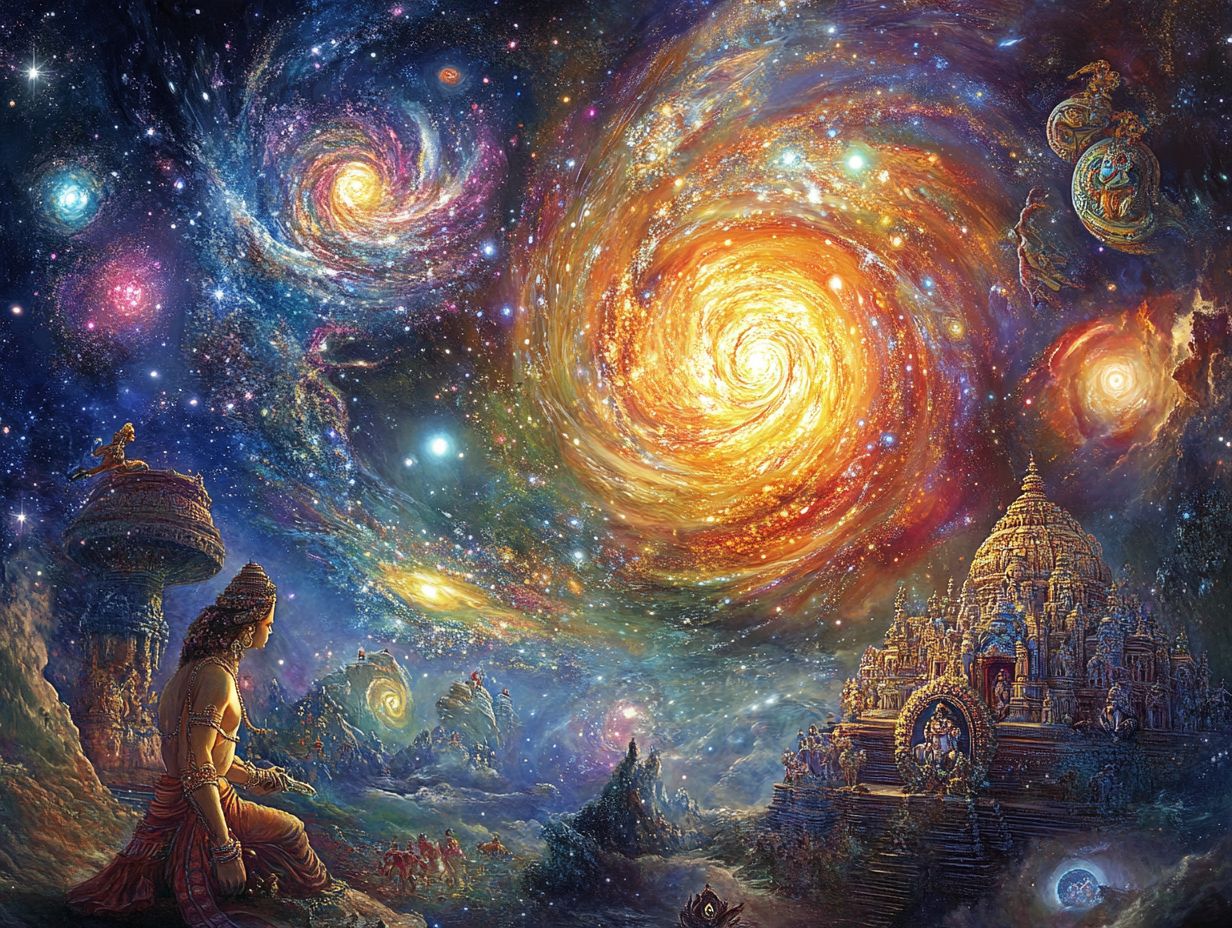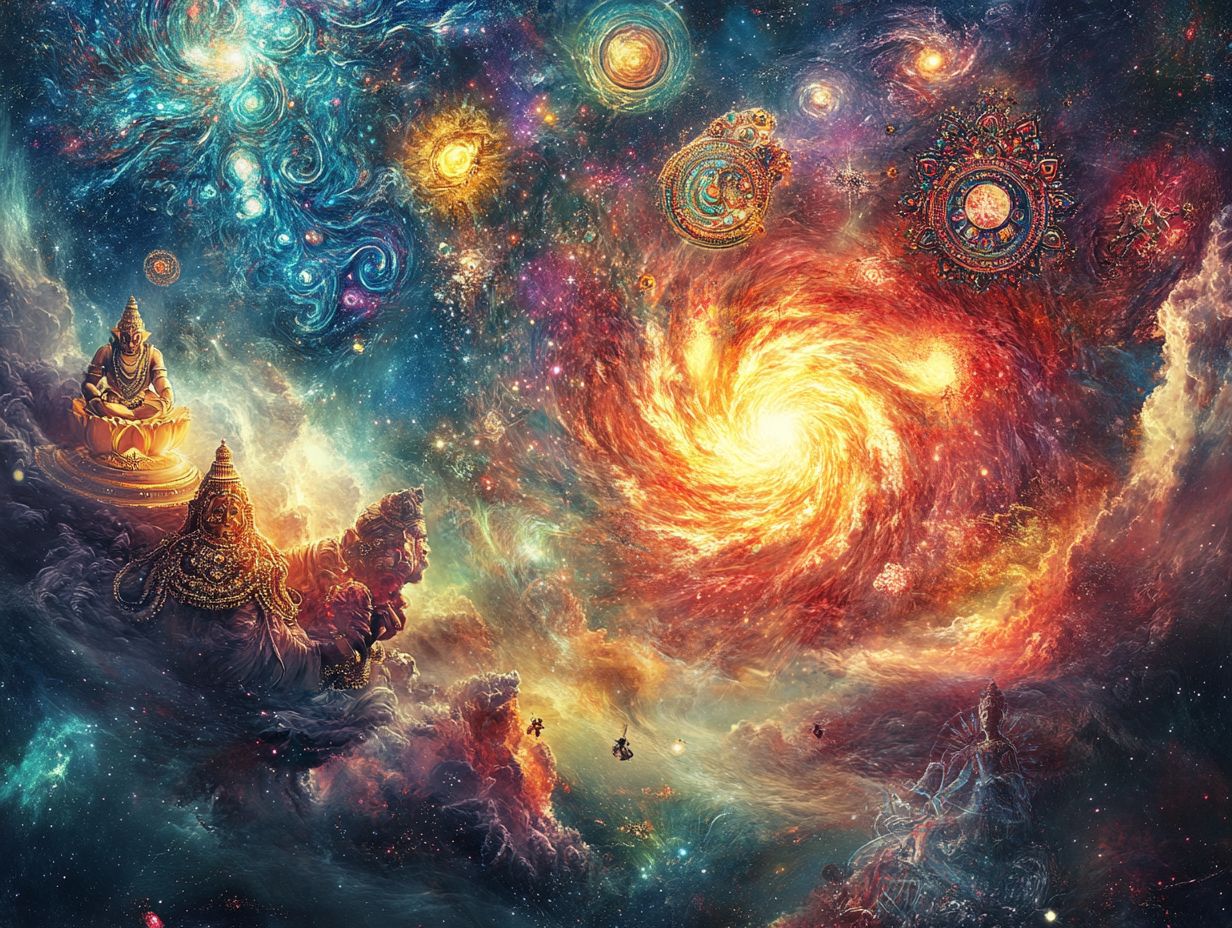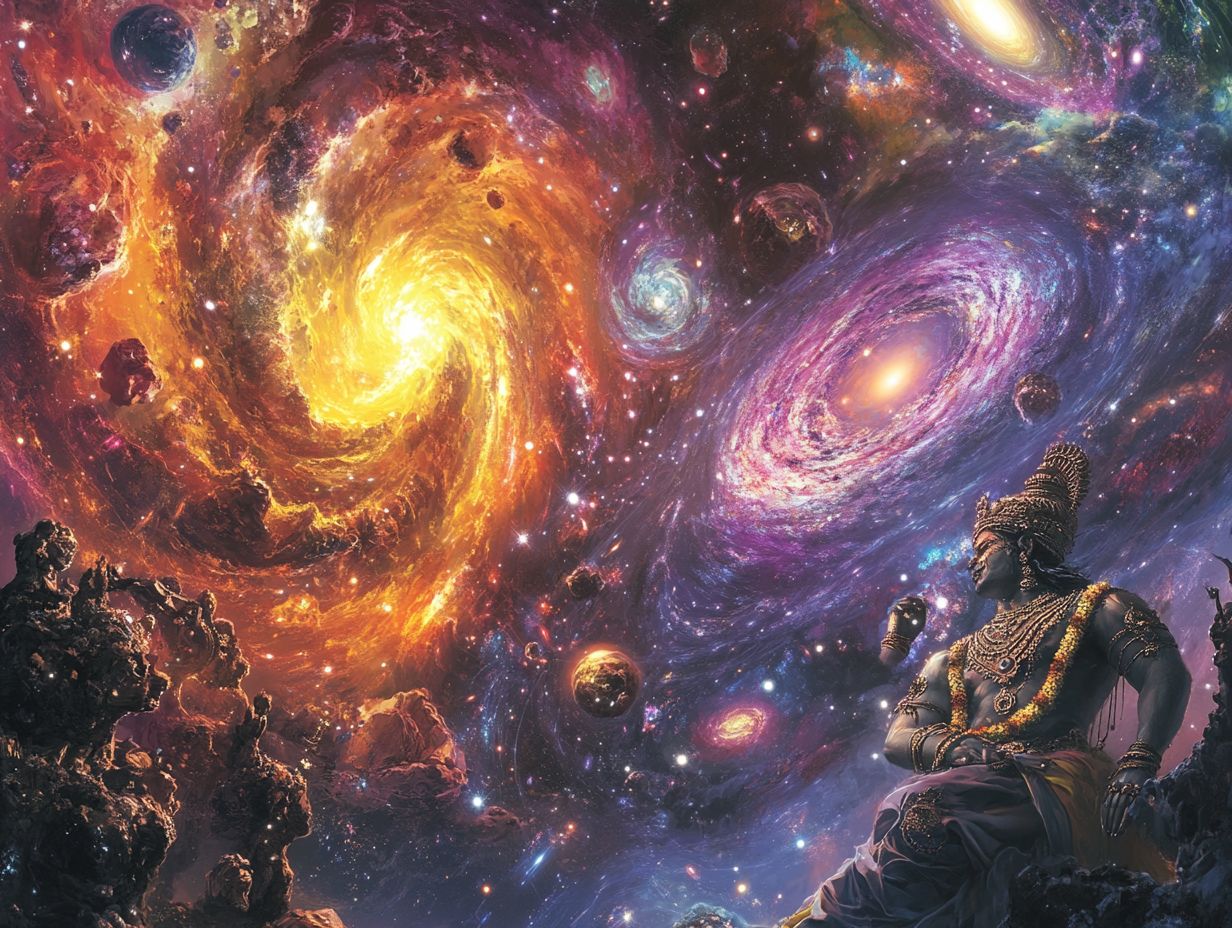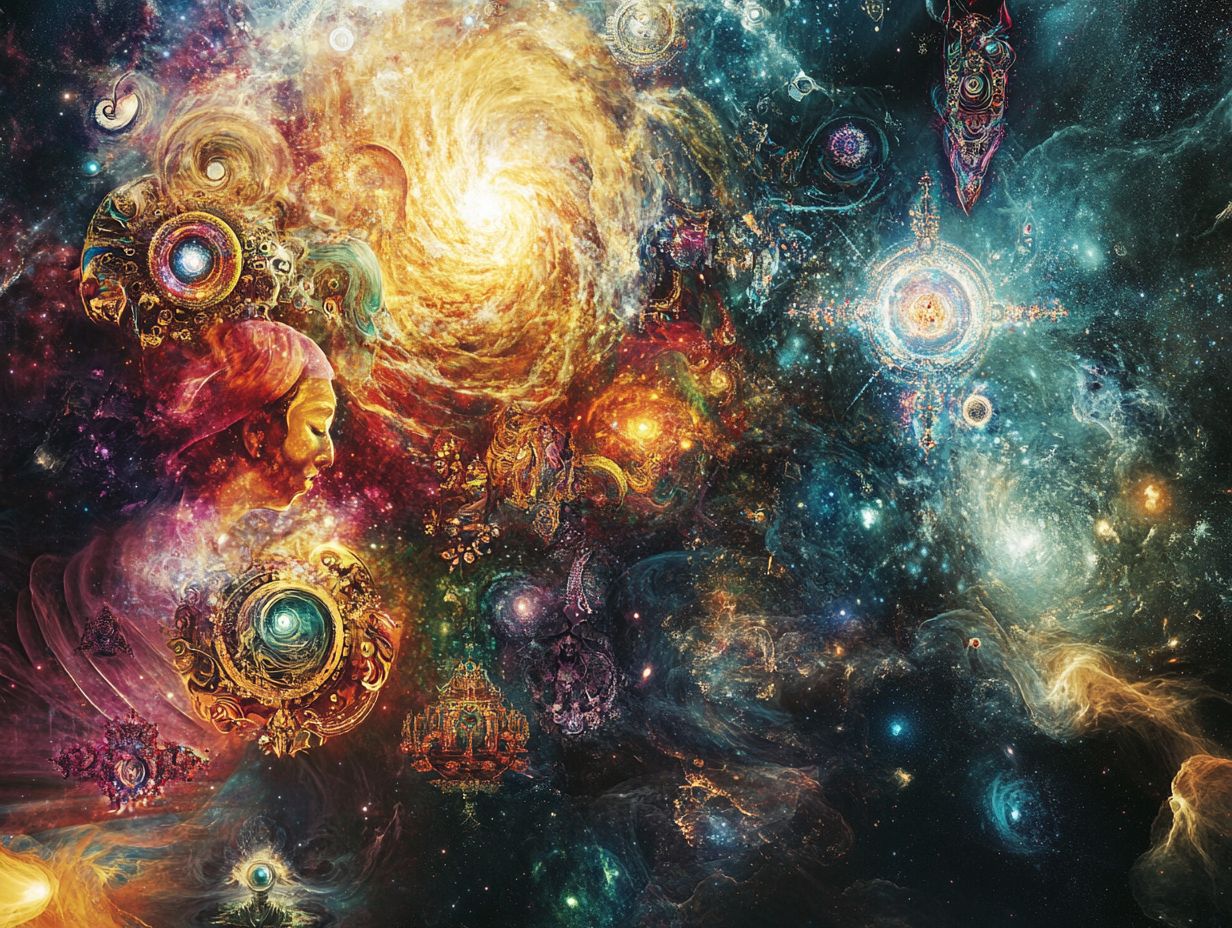Does Multiverse Exist in Hinduism?
The concept of the multiverse has captivated both scientists and philosophers, positing the existence of multiple, perhaps infinite, universes that lie beyond the confines of our own. This notion raises intriguing questions about the intersections between contemporary theories, cosmology, and ancient belief systems.
This exploration delves into the relationship between the multiverse and Hinduism, illuminating the intricate tapestry of Hindu beliefs concerning various worlds and dimensions. By juxtaposing scientific theories with sacred Hindu texts such as the Vedas and Upanishads, one can uncover the profound ways in which these ideas shape notions of reincarnation, karma, and ethics within the religion, ultimately revealing a richer understanding of existence itself.
What is Multiverse?

The existence of multiple worlds and dimensions, often referred to as parallel worlds, is a core aspect of multiverse theories, which explore the nature of reality and the universe.
The concept of the multiverse, an intriguing theory in cosmology, posits the existence of multiple universes or dimensions, each potentially harboring alternate realities and spiritual realms. This idea transcends conventional understanding, inviting profound philosophical inquiry into the essence of existence, reality, and the interconnectedness of all things.
Within the sphere of spirituality, the multiverse weaves a complex narrative that intersects with various cultural beliefs and wisdom traditions, prompting a reevaluation of perceptions regarding divinity, consciousness, and the universe itself. As humanity delves deeper into these metaphysical concepts, the implications for our comprehension of existence and reality become increasingly captivating.
What are the Theories about Multiverse?
Theories from theoretical physics, such as time travel and space-time continuums, enrich the discussion about the multiverse and its place in philosophical discourse.
Scientific theories and empirical evidence continue to shape our understanding of the multiverse, blending with ancient scriptures and Indian philosophy.
Various theories about the multiverse have emerged from the realms of quantum physics and string theory, each presenting distinct frameworks that endeavor to elucidate the existence of multiple universes or realities. These theories frequently originate from philosophical inquiries into the very nature of reality and existence, suggesting that our universe might merely be one among many interconnected dimensions, each governed by its own unique cosmic order and laws. Recent discussions also explore the philosophical implications and possible empirical evidence supporting these theories.
As scientists and philosophers delve into these captivating concepts, they challenge conventional perspectives on existence and push the frontiers of metaphysics and theoretical physics.
The bubble universe theory, for example, posits that our universe resembles a single bubble among an infinite sea of others, each potentially harboring different physical constants and laws. In contrast, the many-worlds interpretation proposes that each decision spawns branching realities, resulting in an infinite array of outcomes that coexist simultaneously.
String theory enhances this discussion by suggesting that these multiple dimensions arise from fundamental strings vibrating at distinct frequencies, thereby reshaping our understanding of time and space.
As these theories intertwine, they not only deepen the comprehension of the cosmos but also provoke profound philosophical reflections on identity, fate, and the very essence of reality itself.
What is Hinduism?
Hinduism’s deep philosophical roots extend into realms of metaphysics, ontology, and epistemology, providing a comprehensive framework for understanding the universe and our place within it.
Hinduism encompasses a rich array of philosophical implications and mystical beliefs that delve into the existential questions and the nature of reality.
Hinduism, often referred to as Sanatana Dharma, represents a rich tapestry of religious beliefs, philosophies, and practices that have evolved over millennia within the cultural landscape of the Indian subcontinent. At the heart of Hinduism lie its sacred texts, particularly the Vedas and Upanishads, which offer profound insights into existence, the cosmos, and the divine. Additionally, the Bhagavad Gita provides philosophical discourse on the nature of reality and consciousness.
This ancient religion encompasses a diverse array of beliefs regarding the universe, creation, and the intricate relationship between the Atman (soul) and Brahman (the ultimate reality). It invites adherents to engage with deep questions surrounding consciousness, karma, and dharma.
As a living tradition, Hinduism continues to inspire spiritual practices, rituals, and philosophical discussions that resonate with those in search of truth and enlightenment.
What are the Beliefs in Hinduism?
The beliefs in Hinduism cover a wide range of existential questions and ontological inquiries, providing insights into the nature of reality and the universe.
Hinduism’s doctrinal beliefs encompass a wide range of existential and metaphysical concepts, including sacred texts and spiritual practices.
Hindu beliefs construct a sophisticated framework intricately woven around key concepts such as Brahman (the ultimate reality), Atman (the individual soul), karma (the law of cause and effect), and dharma (righteous duty). These principles serve as guiding lights for adherents on their spiritual journeys, emphasizing the pursuit of moksha, or liberation from the cycles of birth and death, as the pinnacle of existence. The concepts of samsara (the eternal cycle of birth, death, and rebirth) and non-duality also play crucial roles in shaping the spiritual paths of practitioners.
Hinduism profoundly recognizes the significance of ethical living and the interconnectedness of all beings, fostering an innate sense of responsibility toward oneself and the cosmos.
Through the lens of these fundamental concepts, practitioners partake in a variety of personal and communal rituals that reflect their understanding and application of these beliefs in everyday life. The principle of karma, for instance, urges individuals to engage in righteous actions, as their choices directly shape their future destinies. Likewise, adherence to one’s dharma cultivates a sense of duty, ensuring that individuals contribute positively to the fabric of their communities.
The realization of Atman as a manifestation of Brahman engenders a profound sense of unity, inspiring compassionate actions and ethical conduct among followers. Collectively, these beliefs not only influence personal aspirations for spiritual enlightenment but also nurture the cultivation of a harmonious society.
What is the Concept of Multiverse in Hinduism?
The interplay of dimensions and sacred geometry in Hindu cosmology highlights the profound nature of the multiverse and its philosophical implications.
Existential philosophy and the ontology of Hindu beliefs provide deep insights into the concept of multiverse and its metaphysical foundations.
In Hindu cosmology, the concept of the multiverse is intricately interwoven into ancient texts and creation stories, hinting at the existence of multiple universes that experience cycles of creation and dissolution. These narratives, prominently found in the Puranas and other sacred literature, reveal a profound understanding of the universe as a dynamic, ever-evolving entity governed by cosmic principles. This cosmology also incorporates sacred geometry and astrological beliefs, emphasizing the interconnectedness of various worlds.
The cyclical nature of time in Hindu thought aligns seamlessly with multiverse theory, presenting a worldview where existence is not linear but rather an intricate tapestry of diverse realities and dimensions, each playing a vital role in the cosmic order. This perspective also touches upon mystical and metaphysical concepts, adding profound depth to the understanding of the universe.
What are the Different Worlds in Hinduism?
Hindu cosmology presents a myriad of parallel worlds or dimensions, each reflecting different levels of spiritual ascension and cosmic consciousness. These worlds are intricately described in creation myths and sacred texts, offering a pathway to understanding the universe’s complex structure.
In Hinduism, the universe is envisioned as a complex tapestry of various worlds, known as lokas, each representing distinct spiritual planes and cosmic realms of existence. These lokas function as dimensions where deities, souls, and diverse beings engage, reflecting a hierarchy of existence that stretches from the exalted realms of divine consciousness to the more grounded realms of material life. This hierarchical structure offers insights into the nature of duality and non-duality in Hindu cosmology.
This intricate multilevel structure facilitates a profound exploration of the interconnectedness of life and the myriad realities that populate the sacred universe.
Among these lokas lies Swarga, a celestial domain characterized by ultimate bliss and divine pleasures, where virtuous souls revel in the rewards of their righteous deeds. Conversely, Naraka presents a sobering contrast, serving as a realm of punishment for those who have deviated from the path of righteousness. Other realms like Bhuloka also serve as spaces for karmic actions and spiritual growth, underscoring the cyclical nature of existence.
Other lokas, such as Bhuloka the earthly realm act as a stage for karmic actions, where souls continue their journey of evolution and growth. Each loka not only symbolizes unique experiences but also embodies the principles of karma and dharma, guiding souls toward liberation and enlightenment within the vast cosmic framework of Hindu beliefs.
What are the Different Dimensions in Hinduism?

The dimensions of existence in Hinduism are vast and intricate, touching upon aspects of mysticism, transcendentalism, and yogic philosophy.
The dimensions within Hinduism encompass a nuanced understanding of spiritual realities, reflecting the intricate nature of consciousness and divine existence. These dimensions extend beyond the physical realm, diving into the metaphysical, and represent various levels of existence and awareness. This framework allows for a profound exploration of the soul’s journey toward enlightenment and liberation. Additionally, concepts such as cosmic consciousness and transcendence are integral to understanding these dimensions.
Central to Hindu philosophy is the emphasis on transcending these dimensions through practices such as meditation and yoga, which serve to facilitate spiritual awakening and the expansion of consciousness. The ancient scriptures offer detailed guidance on these spiritual practices, highlighting their role in achieving unity and divine harmony.
As practitioners immerse themselves in these spiritual dimensions, they encounter diverse states of awareness and perception, each enriching their holistic comprehension of existence. The interconnectedness of these levels fosters a deep understanding of the self, significantly influencing both personal and collective journeys. This journey of spiritual evolution and the realization of universal consciousness are pivotal aspects of the Hindu spiritual path.
Through traditional rituals and teachings, individuals receive guidance to discern the subtleties of their spiritual path, often leading to a more profound realization of their place within the cosmos. These rituals also emphasize the importance of sacred symbols and sacred knowledge in facilitating spiritual practices and consciousness expansion.
Ultimately, these dimensions collectively function as a roadmap for seekers navigating the complexities of life, all while striving for moksha, or liberation, from the relentless cycle of rebirth. This roadmap underscores the importance of understanding the vibrational energies and cosmic cycles that influence spiritual awakening and ascension.
What is the Role of Gods and Goddesses in the Multiverse in Hinduism?
The gods and goddesses in Hinduism are vital to understanding the sacred geometry and cosmic order that define the multiverse and its dimensions.
The gods and goddesses in Hinduism are not just divine beings but are also integral to understanding the cosmic dance and sacred geometry that define the multiverse.
In Hinduism, gods and goddesses assume pivotal roles within the multiverse, each embodying distinct aspects of divine manifestation that govern the cosmic order and uphold balance across various realms. Deities such as Brahma, Vishnu, and Shiva exemplify unique qualities and functions, intricately influencing the cycles of creation, preservation, and dissolution that define the multiverse. This divine interplay underscores the philosophical discourse on the existence of God and the nature of reality within Hinduism.
The concept of avatars further emphasizes the dynamic interplay between divinity and the material world, as these incarnations of the divine interact with humanity, guiding souls on their journey toward enlightenment and spiritual awakening. These avatars, as highlighted in the Bhagavad Gita and other sacred texts, showcase the existence of multiple worlds within the realm of Hindu cosmology.
How do Gods and Goddesses Interact with the Multiverse?
The interaction of gods and goddesses with the multiverse represents a profound dimension of Hindu belief, wherein divine intervention intricately shapes the cosmic order and influences the evolution of spiritual teachings. These interactions are vividly illustrated through myths and narratives that depict how deities engage with various realms, guiding souls and upholding universal law across different dimensions. Such relationships emphasize the interconnectedness of all beings within the sacred universe and underscore the pivotal role of divine forces in maintaining harmony and balance through cosmic consciousness.
In the epic Mahabharata, for instance, Lord Krishna assumes the role of a divine guide, steering the Pandavas through their earthly tribulations while simultaneously influencing the cosmic battle of good versus evil. Likewise, the Puranas depict Vishnu’s various avatars, such as Rama and Krishna, intervening in human affairs to restore dharma, highlighting the impact of divine actions on both individual lives and the larger multiverse.
These narratives reinforce the understanding that deities are not remote entities; rather, they actively engage in guiding humanity and ensuring the seamless functioning of the cosmos. This dynamic relationship inspires rituals and practices aimed at aligning oneself with these divine principles, inviting individuals to participate in the sacred dance of existence.
What are the Similarities and Differences between Hinduism and the Scientific Theory of Multiverse?
The exploration of the similarities and differences between Hinduism and the scientific theory of the multiverse unveils a captivating dialogue between ancient wisdom and contemporary scientific inquiry. Both frameworks engage deeply with the nature of existence, reality, and the interconnectedness of all things, yet they arise from distinctly different methodologies and epistemologies. Hindu cosmology, as expressed in the Vedas and Upanishads, provides a rich philosophical foundation that aligns intriguingly with modern scientific theories.
While scientific theories are grounded in empirical evidence and mathematical models, Hinduism presents profound philosophical insights through sacred texts and spiritual teachings. This interplay invites thoughtful contemplation on the relationship between science and spirituality, highlighting how each domain enriches our understanding of the universe. The philosophical implications of such an interplay foster a deeper understanding of the nature of reality and stimulate existential questions that have intrigued scholars for centuries.
Do Hindu Texts Mention Multiverse?
Hindu texts, particularly the Puranas and other ancient scriptures, articulate a profound understanding of the multiverse, presenting a complex vision of creation and existence that transcends linear storytelling. Within these scriptures, multiple realms and cycles of creation are described, suggesting a worldview that accommodates diverse realities and spiritual dimensions within the cosmic order. These ancient scriptures delve into mystical concepts such as alternate realities and higher dimensions, enriching the tapestry of Hindu cosmology.
The depiction of these various universes in texts such as the Vishnu Purana and Bhagavata Purana weaves a rich tapestry that not only expands the narrative of existence but also raises profound inquiries regarding the nature of reality itself. Such teachings illuminate the cyclical nature of time and space, where creation and dissolution occur in a continuous dance, allowing for limitless possibilities within a universe that is both ordered and chaotic. The concept of creation cycles and cosmic dance underscores the intricate balance of creation and destruction in Hindu cosmology.
This philosophical perspective invites a reevaluation of existence, prompting individuals to contemplate their place within this expansive multiverse. It reinforces the notion that each realm presents unique lessons and pathways for spiritual development. Furthermore, these interpretations resonate significantly with modern cosmological theories, fostering a dialogue between ancient wisdom and contemporary scientific exploration.
Is there Scientific Evidence for the Multiverse in Hinduism?
The inquiry into whether scientific evidence substantiates the multiverse concept within Hinduism creates a fascinating intersection of quantum physics and metaphysical exploration, warranting a sophisticated examination of both domains. Hinduism’s rich tradition of philosophy and spirituality provides a fertile ground for exploring these intersections, especially when considering the metaphysical concepts embedded in its teachings.
As researchers delve into the enigmas of the universe, they unveil parallels between ancient philosophies and avant-garde theories, cultivating a dialogue that transcends conventional boundaries. The Upanishads and other Vedic texts offer insights that resonate with theoretical physics and modern discussions around space-time and the infinite nature of the cosmos.
Of particular note is the concept of an infinite array of realities, which intriguingly resonates with the notion of Brahman in Hindu philosophy, where the ultimate reality embodies all possibilities. This relationship underscores how contemporary physics can enhance the understanding of timeless metaphysical frameworks, raising profound questions about consciousness, existence, and the interconnectedness of all things. The concept of duality and non-duality in Hindu thought parallels many quantum physics discussions, emphasizing the unity of perceived opposites within the cosmic framework.
Through this exploration, one can appreciate the depth that interdisciplinary discourse between scientific inquiry and spiritual traditions brings to insights regarding the fundamental nature of reality.
How does the Concept of Multiverse Impact Hindu Beliefs and Practices?

The concept of the multiverse profoundly influences Hindu beliefs and practices, particularly in relation to reincarnation, karma, and the fulfillment of dharma. This intricate understanding compels practitioners to perceive their actions as interconnected across various lives and realities, instilling a heightened sense of responsibility in their spiritual journey. The notion of moksha or liberation from the eternal cycle of samsara (reincarnation) takes on a new dimension when considered within the vast expanse of the multiverse.
As adherents reflect on the implications of the multiverse, they are motivated to nurture mindfulness and ethical considerations in their daily lives, thereby enriching their path toward spiritual evolution and enlightenment.
Does the Multiverse Affect the Idea of Reincarnation in Hinduism?
The multiverse concept profoundly shapes the understanding of reincarnation in Hinduism, positing that the soul’s journey transcends multiple dimensions and realities within the cycles of existence. This view enhances the comprehension of karma, illustrating how actions and choices resonate across various lives throughout the multiverse. This perspective is deeply embedded in yogic philosophy as well, where the soul s progress is seen as an ongoing journey through different layers of consciousness and spiritual realms.
As practitioners contemplate their spiritual evolution, they recognize reincarnation not merely as a linear progression but as part of an expansive, interconnected tapestry governed by universal laws.
This intricate framework underscores that every moral action or neglect in one incarnation can reverberate in another, serving as a catalyst for ethical living. With countless realities influenced by individual choices, adherents are encouraged to uphold dharma, reinforcing the notion that their behavior affects not only their current existence but also the potential paths of their soul’s journey.
Consequently, this understanding fosters a profound sense of responsibility, prompting followers to consider the broader implications of their decisions. This cultivates a more conscientious approach to life, ultimately striving to harmonize their existence with the multifaceted nature of reality.
Do Hindus Believe in Parallel Universes?
Many Hindus embrace the concept of parallel universes, perceiving them as an extension of their understanding of the multiverse that encapsulates the diverse spiritual dimensions and cosmic realities inherent in existence. This belief harmonizes with the notion that multiple realities coexist, each presenting unique experiences and opportunities for spiritual advancement. Parallel universes also resonate with teachings on divine manifestation and alternate realities, allowing for a richer exploration of the sacred and the profane within spiritual practices.
By recognizing the existence of parallel universes, practitioners are inspired to delve into the depths of consciousness and explore the interconnectedness of all beings across various realms. This awareness encourages meditation, yogic practices, and other forms of spiritual practices to achieve higher states of consciousness expansion and existential inquiry.
These perspectives find their roots in ancient texts and teachings that depict a vast tapestry of existence, wherein each individual soul embarks on a journey through varying states of being across different planes. The belief in parallel universes not only enriches spiritual practices, such as meditation and yoga, but also provokes philosophical inquiry into the very nature of reality itself.
As individuals engage with these concepts, they may uncover profound insights regarding their purpose and the essence of life, fostering a deeper understanding of their place in the universe and the exhilarating possibilities that extend beyond their immediate perception.
What are the Implications of the Multiverse in Hinduism?
The implications of the multiverse within Hinduism permeate multiple facets of existence, challenging conventional perspectives and prompting a thorough reevaluation of ethical considerations as well as spiritual evolution. These teachings underscore the importance of spiritual practices such as meditation and yoga, aiming to achieve ascension and divine harmony within the cosmic order.
As adherents reflect on the intricate interconnectedness of all beings across various dimensions, they are urged to contemplate their responsibilities within the vast cosmic framework. This heightened awareness cultivates a profound understanding of karma, steering individuals toward a more mindful existence and the relentless pursuit of enlightenment through deliberate and conscious choices.
How does the Multiverse Concept Affect the Hindu Idea of Karma?
The concept of the multiverse profoundly influences the Hindu understanding of karma, illuminating the intricate web of actions and their consequences that spans various dimensions of existence. This perspective prompts adherents to regard their ethical lives not merely as a linear journey but as a richly woven tapestry that connects multiple lives and realities, where every decision resonates throughout the multiverse.
Such an awareness cultivates a deeper sense of personal responsibility and an acute understanding of how one’s actions affect the overarching cosmic order.
By situating karma within the framework of the multiverse, individuals may come to view their ethical conduct as part of a broader dialogue that extends beyond individual lifetimes. This expansive outlook challenges conventional ideas of reward and punishment, positing that the effects of one s actions reverberate through countless existences rather than being confined to a single lifetime.
Consequently, followers of Hinduism may find themselves inspired to act with enhanced compassion and mindfulness, recognizing that kindness in one realm can generate positivity in others. This interconnectedness not only fosters moral accountability but also nurtures a profound compassion for all beings, as every entity participates in the intricate fabric of universal existence.
What are the Ethical Considerations in a Multiverse according to Hinduism?
Ethical considerations within the context of a multiverse, as interpreted through Hinduism, present profound questions regarding the moral implications of actions that traverse multiple realities and dimensions. Practitioners, embracing the notion of interconnectedness, find themselves compelled to reflect on how their choices resonate with spiritual principles and the universal laws that govern existence.
This introspection deepens their understanding of dharma, guiding individuals toward actions that cultivate harmony and balance within the cosmic order.
In this expansive framework, the concept of dharma transcends mere individual conduct, inviting a broader cosmic perspective that posits that every action sends ripples across myriad worlds. When faced with ethical dilemmas, practitioners are encouraged to consider the potential ramifications of their decisions, not only within their immediate sphere but also across various levels of existence.
This nuanced approach engenders a profound sense of responsibility, urging individuals to act with awareness and intention, mindful that their choices contribute to the welfare of the entire universe.
Ultimately, aligning one’s actions with dharma nurtures a deeper spiritual connection and fosters a more harmonious existence within the multiverse.
Frequently Asked Questions

Does Multiverse Exist in Hinduism?
Yes, according to Hinduism, the concept of multiverse is an integral part of its belief system.
What is the belief about Multiverse in Hinduism?
Hinduism believes in the existence of multiple universes, or multiverses, which are all created by the same divine force.
How is the concept of Multiverse explained in Hindu scriptures?
The Vedic texts, such as the Upanishads, describe the concept of multiverse as the manifestation of numerous worlds within the universe.
Is the Multiverse theory supported by any Hindu deity?
Yes, the Hindu god Brahma is often depicted as having multiple heads, each representing a different universe within the multiverse.
What is the purpose of Multiverse in Hinduism?
In Hinduism, the existence of multiverse demonstrates the vastness and diversity of creation by the divine, allowing for infinite possibilities and experiences for souls to evolve.
Does the concept of Multiverse in Hinduism have any scientific backing?
While there is no scientific proof of the existence of multiverse, some modern theories in physics, such as string theory, align with the Hindu belief of multiple dimensions and universes.
